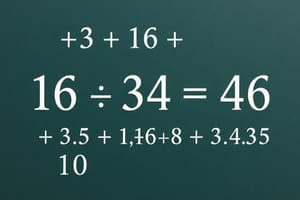Podcast
Questions and Answers
What characteristic distinguishes prime numbers from other numbers?
What characteristic distinguishes prime numbers from other numbers?
- They are multiples of all prime numbers
- They have more than two distinct factors
- They have only one factor (correct)
- They are always greater than 1
What is the product of a set of factors equal to?
What is the product of a set of factors equal to?
- The difference of the factors
- The original number (correct)
- The square of the original number
- The sum of the factors
Which technique uses factors and multiples to ensure secure communication and data exchange?
Which technique uses factors and multiples to ensure secure communication and data exchange?
- Blockchain
- Data compression
- Symmetric encryption
- Public-key cryptography (correct)
In what context are factors and multiples used to describe the behavior of physical quantities like sound frequency and resonance?
In what context are factors and multiples used to describe the behavior of physical quantities like sound frequency and resonance?
Flashcards are hidden until you start studying
Study Notes
Factors and Multiples: A Comprehensive Exploration
Factors and multiples are fundamental concepts in mathematics, particularly in the study of numbers and arithmetic. In this article, we'll dive deep into these ideas, exploring their definitions, real-world applications, and subtopics related to them.
Factors A factor, also known as a divisor, is a positive integer that can divide a given number without leaving a remainder. To find the factors of a number, you need to identify all the positive integers (except 1 and the number itself) that can be multiplied together to produce that number. For example, the factors of 12 are 1, 2, 3, 4, 6, and 12.
Multiples A multiple is a number that is obtained by multiplying a given number by a positive integer, excluding 1. For example, the multiples of 5 include 5, 10, 15, 20, and so on. The set of all multiples of a number forms an arithmetic sequence with a common difference equal to the given number.
Factors and Multiples: Relationships and Properties
- The factors of a number are always less than or equal to that number, while the multiples are greater than or equal to the given number.
- Every positive integer has at least two distinct factors: 1 and itself.
- A number can have more than two factors if it is either a perfect square or a product of more than two distinct prime factors.
- A number that has only two factors (1 and the number itself) is called a prime number.
- The product of a set of factors equals the original number.
- The sum of the factors of a number is called the "factor sum" or "proper divisor sum."
Factors and Multiples: Applications and Subtopics
Factors and multiples are useful in various domains:
1. Number Theory Factors and multiples are fundamental concepts in number theory, the branch of mathematics that studies the properties of integers. The study of factors and multiples helps us learn more about the structure and behavior of numbers.
2. Algebra Factors play an essential role in factoring algebraic expressions, which is a technique used to simplify expressions by breaking them down into simpler terms.
3. Computational Science Factors and multiples are crucial in computing algorithms like prime number generation and factorization, which are used to solve complex mathematical problems.
4. Cryptography Factors and multiples form the basis of public-key cryptography, a technique that ensures secure communication and data exchange.
5. Number Games Factors and multiples are used in a variety of number games, puzzles, and quizzes. For example, the game "Guess My Number" relies on your ability to find factors and multiples of a given number.
6. Engineering and Physics Factors and multiples are used in engineering and physics to describe the behavior of various physical quantities, like sound frequency and resonance.
Conclusion Factors and multiples are fundamental concepts in mathematics that have a wide range of applications. They form the basis of many mathematical concepts and techniques, and they are crucial in various domains, such as number theory, algebra, computational science, cryptography, and engineering. Understanding factors and multiples will undoubtedly enrich your mathematical and computational skills.
Studying That Suits You
Use AI to generate personalized quizzes and flashcards to suit your learning preferences.




